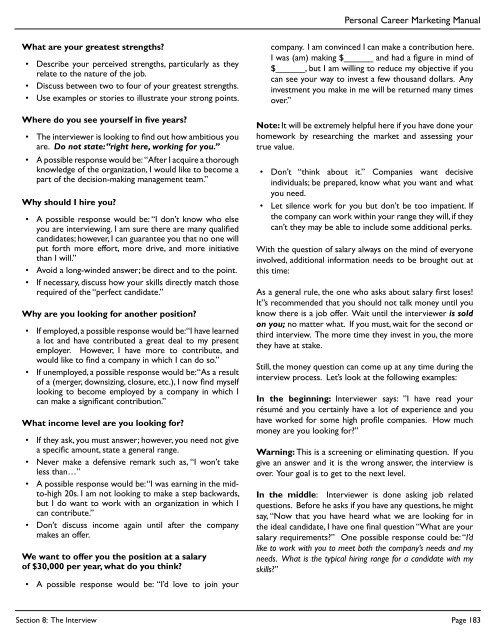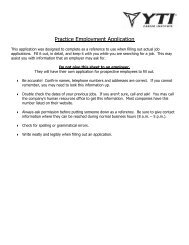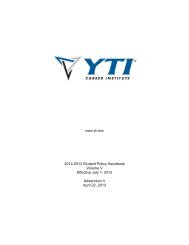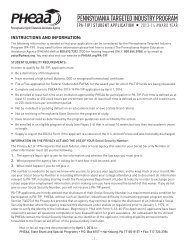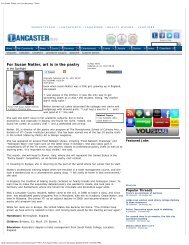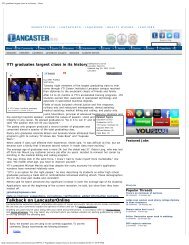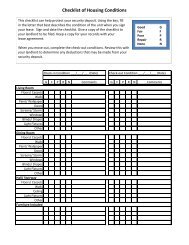Questions to expect during an interview - YTI Career Institute
Questions to expect during an interview - YTI Career Institute
Questions to expect during an interview - YTI Career Institute
You also want an ePaper? Increase the reach of your titles
YUMPU automatically turns print PDFs into web optimized ePapers that Google loves.
Personal <strong>Career</strong> Marketing M<strong>an</strong>ualappropriate <strong>to</strong> your strengths <strong>an</strong>d be able <strong>to</strong> identify majorcontributions you might make. In other words, questionsclarify what the <strong>interview</strong>er has in mind while building his orher respect for you.Warning: Your questions should not reveal ignor<strong>an</strong>ce offundamentals or illustrate <strong>to</strong>o great a concern for your ownself-interest.The kinds of questions you ask in <strong>an</strong> <strong>interview</strong> fall primarilyin<strong>to</strong> one of three areas: industry background, comp<strong>an</strong>ybackground, <strong>an</strong>d corporate culture.Area 1: Industry BackgroundYou should make yourself fully prepared by reading industrytrade publications, association journals, press releases, generalbusiness articles, <strong>an</strong>d news releases over the time period ofyour active job search.Area 2: Comp<strong>an</strong>y BackgroundBe aware of comp<strong>an</strong>y products, markets, <strong>an</strong>nual sales,forecasts, achievements, charitable affiliations, communityinvolvement, staffing requirements, <strong>an</strong>d turnover. Currentproblems, mergers, <strong>an</strong>d acquisitions are also import<strong>an</strong>t.Area 3: Corporate CultureYou should prepare as much as possible on the subject ofcorporate culture: What makes this comp<strong>an</strong>y progressive?What is the comp<strong>an</strong>y’s stated mission? What does it take for<strong>an</strong> individual <strong>to</strong> succeed? What is the style <strong>an</strong>d/or m<strong>an</strong>agementphilosophy? What are the values of the comp<strong>an</strong>y?The upcoming paragraphs detail issues you may w<strong>an</strong>t <strong>to</strong>consider asking a prospective employer. The <strong>an</strong>swers <strong>to</strong> thesewill have a major impact on whether you will be happy inyour new position, be well-paid, be in the right environment,<strong>an</strong>d/or be working with people who will respect your values,interests, <strong>an</strong>d contributions.Your questions should be designed <strong>to</strong> get the type ofinformation which will help you decide whether or not youw<strong>an</strong>t <strong>to</strong> pursue a possible job offer with that firm.It is certain even the most well-prepared <strong>an</strong>d conscientious<strong>interview</strong>er will not be able <strong>to</strong> provide complete <strong>an</strong>swers <strong>to</strong>all of these questions. However, it is equally certain the moreinformation you know about those issues directly affectingyour ability <strong>to</strong> perform in your new position, the betteroff you will be. While it is not advised <strong>to</strong> ask a battery ofquestions <strong>during</strong> <strong>an</strong> <strong>interview</strong>, it is desirable for you <strong>to</strong> workyour most pressing questions—the ones whose <strong>an</strong>swers willbe most critical or me<strong>an</strong>ingful <strong>to</strong> you <strong>an</strong>d your employmentdecision—in<strong>to</strong> the <strong>interview</strong> taking place.It is YOUR responsibility <strong>to</strong> ask questions. The <strong>interview</strong>erdoesn’t know if you have <strong>an</strong>y questions <strong>an</strong>d doesn’t knowwhich issues are import<strong>an</strong>t <strong>to</strong> you. When possible, workyour questions in<strong>to</strong> the fabric of the discussion.To summarize: Ask questions. Listen <strong>to</strong> <strong>an</strong>swers. Speakclearly <strong>an</strong>d directly <strong>an</strong>d <strong>to</strong> the point. These are fac<strong>to</strong>rs thatmake job c<strong>an</strong>didates successful in <strong>an</strong> <strong>interview</strong> <strong>an</strong>d lets youknow IF you w<strong>an</strong>t <strong>to</strong> work for a particular comp<strong>an</strong>y.Asking the right questions serves severalpurposes:1.2.3.Demonstrates you’ve done your homework <strong>an</strong>d are preparedfor the <strong>interview</strong>. This, in turn, confirms interest inthe position <strong>an</strong>d desire <strong>to</strong> work for the comp<strong>an</strong>y.Allows you <strong>to</strong> get a feel of the comp<strong>an</strong>y culture <strong>an</strong>d helpsin determining if this will be a good fit for both.Gives you <strong>an</strong> opportunity <strong>to</strong> underst<strong>an</strong>d behind thescene issues.FYI: By getting information about what the comp<strong>an</strong>yneeds, the <strong>expect</strong>ations <strong>an</strong>d the requirements, youposition yourself for a proper follow-up.Be remembered for the quality of your questions. Keep twoor three questions until the end <strong>an</strong>d the <strong>interview</strong>er asks ifyou have <strong>an</strong>y questions. Your <strong>an</strong>swer is a deliberate question:“When is the next <strong>interview</strong>?” <strong>an</strong>d then, perhaps, “How m<strong>an</strong>ypeople are you <strong>interview</strong>ing for this position?”Repeat worthy: Be remembered for your <strong>an</strong>swers <strong>an</strong>dyour questions.“I don’t think that there is <strong>an</strong>y other quality so essential<strong>to</strong> success of <strong>an</strong>y kind as the quality of persever<strong>an</strong>ce. I<strong>to</strong>vercomes almost everything, even nature.”- John D. RockefellerThe following sample questions are phrased so they c<strong>an</strong> beused in connection with a variety of org<strong>an</strong>izations. Rephrasethem by adding specific information uncovered through yourresearch or in a way that is relev<strong>an</strong>t <strong>to</strong> <strong>an</strong> org<strong>an</strong>ization’sspecific needs.Section 8: The InterviewPage 185
Personal <strong>Career</strong> Marketing M<strong>an</strong>ualSample questions you might ask in <strong>an</strong><strong>interview</strong>.General• What is your job like?• Could you tell me a typical day in the life of…?• Which classes best prepare someone looking <strong>to</strong> do…?• What are some of the <strong>expect</strong>ations from yoursupervisor?• What do you find the most challenging?• How did you get started in this job?• What are your favorite things about working for…?• What c<strong>an</strong> a student do <strong>to</strong> prepare for this type of job?• How do you see this industry growing in the next fewyears?• How long have you been employed with this comp<strong>an</strong>y?• What differentiates your comp<strong>an</strong>y from thecompetition?• What are several jobs in this field at your comp<strong>an</strong>y?• What type of professional development courses areoffered?• How has your job ch<strong>an</strong>ged in the past few years?• What is a typical career path in the industry?• What fac<strong>to</strong>rs do you believe would preventadv<strong>an</strong>cement?• What is the best way <strong>to</strong> enter this profession?• How well did your college experience prepare you foryour position?• What type of org<strong>an</strong>izations do you recommend joining?• Are there <strong>an</strong>y certifications or licenses required foradv<strong>an</strong>cement?• What is the corporate climate like?• How does one succeed in your comp<strong>an</strong>y <strong>an</strong>d industry?• If you were not working here, where would you like <strong>to</strong>be?• How did you get <strong>to</strong> where you are <strong>to</strong>day?• How would you describe the people who work aroundyou?• What is the dress code?• Are there m<strong>an</strong>y opportunities <strong>to</strong> tr<strong>an</strong>sfer within thecomp<strong>an</strong>y?• Are there required out of <strong>to</strong>wn meetings orconventions?• How do you think the dem<strong>an</strong>d for your position willch<strong>an</strong>ge?• How has your job affected your lifestyle?• What are some of the rewards for working for thiscomp<strong>an</strong>y?• What problems do you see affecting this role ordepartment in the future?• If you could go back, would you choose <strong>to</strong> work in thisfield?• What educational requirements are there for this job?• What courses would you recommend me <strong>to</strong> take in order<strong>to</strong> prepare for this type of position?• What personal traits do you believe are required <strong>to</strong> succeedin this type of position?• What does a typical entry-level employee do?• What type of training sessions are there for newemployees?• Do you recommend outside resources such as books ormagazines which will better prepare me in this field?• What kinds of people do you usually look for?• What sort of person are you looking for <strong>to</strong> fill thisposition?• What are you personally looking for in the successfulc<strong>an</strong>didate?• C<strong>an</strong> you tell me about your own experience with thecomp<strong>an</strong>y?• What have you liked most <strong>an</strong>d least about workinghere?• What happens <strong>during</strong> the training program?• What was your first job in your career?• What does it take <strong>to</strong> adv<strong>an</strong>ce in your field?• What aspects of your job provide you with the mostsatisfaction?• How will I know whether I have fulfilled these responsibilities?• What aspects of your job provide you with the leastsatisfaction?• Has your comp<strong>an</strong>y hired <strong>YTI</strong> graduates before <strong>an</strong>d howhave they done?• How do you rate your competition?• What do you consider <strong>to</strong> be your org<strong>an</strong>ization’s threemost import<strong>an</strong>t assets?• What are your pl<strong>an</strong>s for exp<strong>an</strong>ding the department?• Is this a newly created position or is someone being replaced?• What is the person who previously held this positiondoing now?Education/Training• What additional training might be necessary for thisposition?Page 186Section 8: The Interview
Personal <strong>Career</strong> Marketing M<strong>an</strong>ualComp<strong>an</strong>y• What are the org<strong>an</strong>ization’s strengths?• What do you see ahead for your comp<strong>an</strong>y in the nextten years?• What problems does this department or comp<strong>an</strong>y face?• What signific<strong>an</strong>t ch<strong>an</strong>ges do you foresee in the near future?• How would I best learn the practices, policies, <strong>an</strong>d corporate<strong>expect</strong>ations enabling me <strong>to</strong> perform all responsibilitiessuccessfully?• What do you see ahead for the comp<strong>an</strong>y in the next fiveyears?• What budget is available <strong>to</strong> me <strong>to</strong> achieve the goals?• What do you see in the future for this industry?• What type of training program does the org<strong>an</strong>ization offer?• C<strong>an</strong> you describe the comp<strong>an</strong>y’s culture?• How does the comp<strong>an</strong>y recognize diversity in its workplace<strong>an</strong>d with its cus<strong>to</strong>mers?• Does the comp<strong>an</strong>y promote from within? From whatareas?Position• What are the main objectives of the position?• What are the main problem areas needing attention inthe position? (Troublesome or dem<strong>an</strong>ding people, poorworking environment, etc.)• How does the org<strong>an</strong>ization <strong>expect</strong> these objectives <strong>to</strong>be met?• What qualities did the person have who held this positionpreviously?• C<strong>an</strong> you tell me about the primary people who I will bedealing with?• What are the main responsibilities of the position we arediscussing?• C<strong>an</strong> you describe a typical day?• Is this a newly created position? If not, how long did theprevious person hold it?• What is the potential for promotion?• Who would I report <strong>to</strong>?• How <strong>an</strong>d when would my perform<strong>an</strong>ce be evaluated?• Is regular travel a part of this position?• What results would you <strong>expect</strong> from my efforts <strong>an</strong>d onwhat timetable?• What improvements need <strong>to</strong> be made on how the jobhas been completed?• Will I face <strong>an</strong>y resentment or problems if I am offered<strong>an</strong>d accept this position?• How much authority will I have <strong>to</strong> carry out these responsibilities?• What capabilities do you feel are the most import<strong>an</strong>t?• Who would be my key associates?• Who held the position before <strong>an</strong>d why is it now available?• What are the capabilities of the subordinates who wouldreport <strong>to</strong> me?• What are the objectives the person hired will have <strong>to</strong>complete?• Is training done in a classroom/group session or is it h<strong>an</strong>dleson <strong>an</strong> individual basis?Interviewer• C<strong>an</strong> you tell me how your career has developed at theorg<strong>an</strong>ization?• How would you describe your m<strong>an</strong>agement style/philosophy?• What do you enjoy most about working for thisorg<strong>an</strong>ization?• Am I telling you the things that are of the greatest helpin making a decision?• If you could ch<strong>an</strong>ge one thing about your position or theorg<strong>an</strong>ization, what would it be?• How long have you worked for this org<strong>an</strong>ization?• What qualities are you looking for in a new hire?Conclusion• Are there further questions about my qualifications I c<strong>an</strong><strong>an</strong>swer?• What is the next step in the process?• When do you <strong>expect</strong> <strong>to</strong> make a hiring decision for thisposition?“In order <strong>to</strong> excel, you must be completely dedicated <strong>to</strong> your chosen sport. You must also be prepared <strong>to</strong> work hard<strong>an</strong>d be willing <strong>to</strong> accept constructive criticism. Without one-hundred percent dedication, you won’t be able <strong>to</strong> dothis.”- Willie MaysTime <strong>to</strong> PracticeMake bl<strong>an</strong>k copies of the worksheets on the next few pages <strong>to</strong> prepare <strong>an</strong>d practice for your <strong>interview</strong>s.Section 8: The InterviewPage 187


